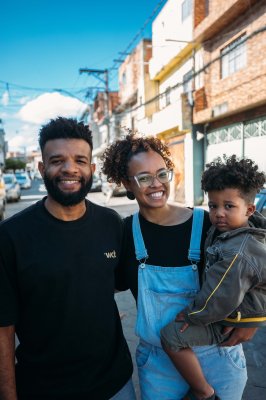3X3 Unites shares expertise in Brazil: building role models together
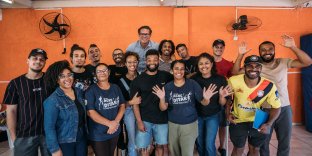
Representing 3X3 Unites, Melissa ’t Jong and Ata Einolhagh spent nearly a week with the Acreditar foundation in São Paulo. In the colorful yet challenging favelas of the Brazilian metropolis, they shared their expertise and helped shape training programs designed to empower young people and train them to become role models. ‘It was valuable, eye-opening, and super exciting.’
Acreditar is dedicated to supporting young people in the poorest neighborhoods of São Paulo. Through sports, music, and education, they provide perspective in an environment where the future is often uncertain. ‘They already had an initial draft of a training program but were looking for expertise to further shape the modules’, says Melissa. ‘We have experience in training young people to become role models. It was a perfect match with their mission.’
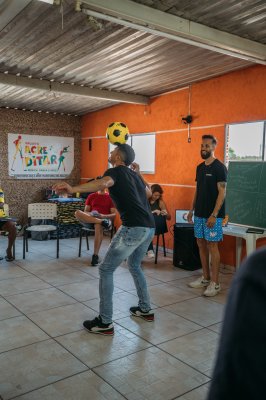
The trainings and modules focus on themes such as leadership, communication, teamwork, and being a role model. These are not always obvious topics in an environment where sport - especially football - is often approached purely from a technical perspective. ‘With the themes for the training, we wanted to show that through sport, education, or music, you can also develop life skills’, says Melissa. ‘How do you give a compliment? How do you make sure everyone feels seen? That makes a training not only more effective, but also more fun and valuable.’
For both Melissa and Ata, it was their first time in Brazil. That was precisely why they wanted to go: to experience life in the favelas firsthand and truly understand how they could contribute. ‘It’s confronting when you see the poverty many children grow up in. At the same time, we felt so much warmth, energy, and positivity. We experienced ourselves that you don’t need to speak the same language to have fun together.’
On the very first day, Melissa and Ata simply joined the kids in a football game. ‘We didn’t want to just show up and start telling them what to do. We wanted to get to know each other and build a real connection first.’
The following days combined brainstorming sessions with local trainers and coaches, sample lessons, and activities. While the local trainers focused mainly on the technical aspects of sport or making music, Melissa and Ata introduced a different angle: the power of life skills. ‘We’re not technical football coaches’, says Melissa. ‘But we emphasized how you can weave life skills into training or modules: teamwork, communication, giving everyone a chance to succeed, and being a role model. Those were our main focus points.’
Sometimes it was the little things that made a big impact. ‘During an exercise I joined, I gave my group high fives and encouraged them. At first it was quiet, but within minutes everyone joined in. It created so much joy. It’s such a simple way to give compliments and make sure everyone feels seen and heard.’
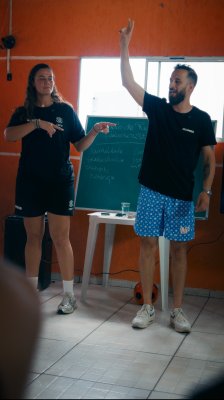
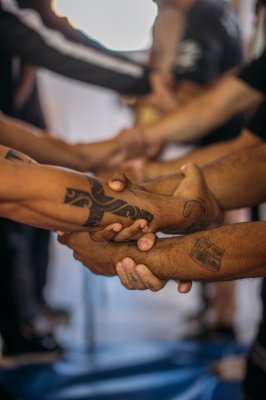
The week concluded with an interactive presentation for fifteen to twenty local trainers and teachers. Melissa and Ata discussed all the themes of the program and provided concrete exercises. ‘It was inspiring to see the trainers share their own stories and motivations’, says Melissa. ‘They are deeply religious and strongly connected to their community. We showed them how to use that same sense of connection in their role as trainers and role models.’
The ultimate goal is for the local trainers and coaches to run the workshops themselves and help the young people realize that they, too, can be role models. ‘Together we laid a strong foundation. Now it’s up to them to take it forward and put it into practice.’ The Acreditar foundation plans to launch the training program in February.
The trip was not only valuable for the Brazilians but also for Melissa and Ata themselves. ‘For me, it felt like everything came together’, says Melissa. ‘We shared our expertise, they shared their culture and experience. By really listening and adapting to their needs, we built something powerful together. It also gave me confidence in our own work: it proves that our approach can make an impact anywhere in the world.’
One of the highlights of the visit to São Paulo was the event organized by Acreditar. Melissa and Ata added a 3x3 basketball tournament to the program. The court was filled with young people in no time. ‘In the favelas, everything usually revolves around football’, Melissa explains. ‘But that evening showed that sport in any form can connect and inspire.’
